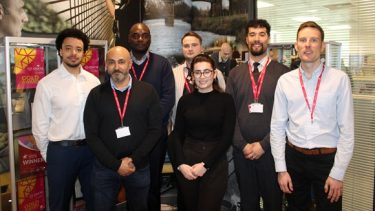The Railway Industry Association’s 14th Innovation Conference has got underway in Wales. Rail Business Daily has been listening to keynote speakers and speaking with exhibitors
Weather resilience, keeping people safe, driving efficiencies, and using data in a better way. Those are the four key priorities as Network Rail enters Control Period 7 next week. That was the message from Robert Ampomah, Chief Technology Officer at Network Rail.
“We are in a really privileged position to be given a £43 billion investment in the next five years,” he said. “It still means that our costs will be very tight, it won’t deliver all the things that we probably would like to deliver, but it will go some way to ensuring we are in a better place going forward.
“It will mean that we have to do a lot more maintenance and maintenance that lasts longer, we will also have to think about the environment in everything that we do. That’s not just about biodiversity, but it is also about achieving net zero and reducing our carbon footprint. We have to do all of that while making the railway safe, but at the same we need to make sure we run a punctual railway.”
He was speaking on the opening day of the Railway Industry Association’s (RIA) Innovation Conference at the ICC in Wales. This year’s event was themed on the topic of ‘Inspired by Innovating’.
During his speech Robert spoke about creating a culture of innovation, something more important than ever as the industry looks to make money stretch further and use technology to ensure services are more reliable, especially in light of more extreme weather.
He explained that during CP6, Network Rail invested a lot of its research and development (R&D) fund in R&D and “very little” in innovation, with a “turning of the dial” in the next five years.
“We’ve still got quite a bit of investment in research but actually balanced now more with development and innovation,” he said. “This is very intentional because we want to make sure we are getting a return on that investment, so we are really driving that value out of the investment that we put on this control period.
“Some of the work we delivered in CP6 will transfer into CP7 in terms of outputs which is really fundamental. Another reason for doing that and the reason that is deliberate is to create this environment and culture of innovation within the rail industry. The rail industry is quite diverse and it is creative, but we need to see that creativity actually deliver outputs for us and a lot of our effort will be on driving that through and rolling out and scaling up those investments.”
Closing his keynote speech, Robert urged the supply chain to use its expertise and creativity to help drive the railway forward.
“We rely on the supply chain and academia to help us strive forward and although we’ve got really tight budgets to work through, I know one way we can do that is by investing, and not just Network Rail industry partners, actually investing in rail,” he said. “Whether we do that through match funding, there are ways in which we can get technologies into rail and then scale it up. I’d invite the industry to join that, get ready for CP7, we know we can all do this together and make a massive difference to where we are going.”
Also on day one was a video message from Network Rail’s Route Director for the Wales and Borders Route Nick Millington, who spoke about “the exciting start of CP7” next week, and the challenges facing the railway, including safety, and the importance on engagement in a collaborative way, and punctuality.
“Punctuality of our service is not good enough,” he said. “There has been a lot of work in the last 18 months and we are seeing the green shoots of recovery on train performance. It is going to be a perpetual challenge.
He also described the upcoming funding settlement as “not excessive and in some ways tight”, with a need to think of “novel ways” to create a railway that is safe and reliable, but equally it has got to be affordable.
Climate change has been described by Network Rail Chief Executive’s Andrew Haines as “the biggest challenge we face” with almost £3 billion of its CP7 plan going towards improving the resilience of the railway over the next five years.
Nick added: “One of the biggest single causes of delay is the weather. We need to get better, we need to run a low carbon transport and we’ve got to get ahead on things like flooding, high winds and heavy rain. We are using technology, but there is always more we can do to stay ahead.”
RIA’s Innovation Conference is an award-winning flagship event in the Unlocking Innovation programme, bringing together inspirational leaders, pioneering engineers, ambitious entrepreneurs and passionate railway professionals.
Scott Waddington, Chair of Transport for Wales (TfW), said to delegates: “Our vision at Transport for Wales is to create a high-quality, safe, integrated, affordable and accessible transport network that the people of Wales are proud of and innovation is key to our success in that and collaboration is absolutely essential in achieving that. We have a dedicated innovation team and budget available to support the business so that innovation can be trialled before it becomes business as usual and we are really trying to create a culture of innovation within the business to benefit our customers and colleagues.
“Innovation is really integral to everything we do at TfW even for our bread and butter of rail ticketing. Just last month we launched pay as you go fares where customers can now take advantage of the cheaper fares thanks to the launch of a new contactless tap in tap out payment service on key routes across South East Wales making it faster, easier and cheaper to travel.”
This year’s Innovation Conference features the events largest exhibition hall ever with 74 companies exhibiting, as well as Network Rail and Transport for Wales Zones. There is also be 23 exhibition spotlight pitches, Future Focus zone full of new innovations and robots, pitch sessions and tech talks.
Darren Caplan, Chief Executive of RIA, who opened to event, said: “After a difficult few years with the COVID pandemic, and more latterly the recent cancellation of HS2 Phase 2, this year we have a big opportunity to reset rail.
“It is so important right now that we are open to innovation as this will deliver the efficiencies that industry needs and will address the challenges including weather resilience, decarbonisation, improved workforce safety, providing better services, attracting customers to use the railway, and providing value for national, regional and local government funds.
“It is crucial that we have an innovation mindset both in terms of the innovation itself and the process of adopting innovation.”
Also speaking on day one included Rebecca Jeffrey, New Mobility Lead at Uber; Dave Looney, Head of Product Strategy at telent; Dr Rachel McInnes, Co-Director for Joint Centre for Excellence in Environmental Intelligence, Met Office; Arjen Zoeteman, Senior Program Manager – Research at ProRail; and TechTalks from ABB, Capgemini, Complete Cyber, Helix Rail and Thales.
On Wednesday there will be keynotes from Alexandra Luck, Head of Programme, National Digital Twin Programme, Department for Business and Trade; Dr Joanna White, Roads Development Director, National Highways; Murven Wan, Mechanical Design Engineer, Transmission Dynamics.

